Bobby Cox and the Future of Texas Wine
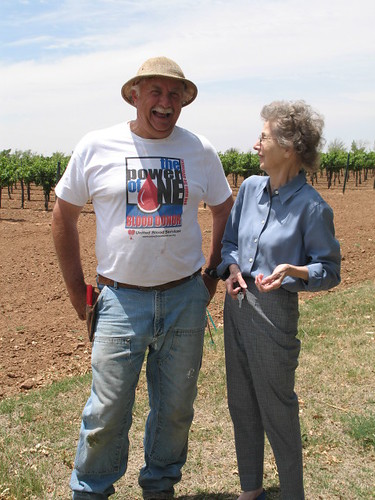
Bobby Cox and Mrs. Cooper, owner of Cooper Vineyard
I met Bobby Cox when I was working in retail. He was perusing the Italian whites, and all it took was for me to ask what he was looking for to start an hour's discussion on the possibilities of great wine in Texas. It was an exciting conversation for me, and I spent days afterward giddy with the prospect that my homestate could finally come into it's own in the wine world. Since then, we've kept in touch by email, and I decided he was the perfect final interview for this wine tour.
There are few others who can boast thirty years' worth of work in the Texas wine industry. Bobby's seen it all, from the enthusiasm for Texas potential in the early eighties to the current state of inconsistent quality and overpriced disappointments. His skill with grapes is matched only by his infectious hope that the potential of the Texas wine market will someday break on through. When he talks about Texas wine, he talks ambitiously, sometimes angrily, sometimes with a tinge of frustration.
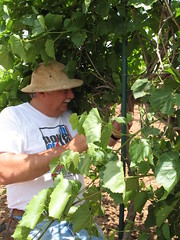 I followed Bobby while he tended to two of the vineyards under his care. He showed me how to graft buds, explained the use of 'gin trash' (remnants of raw cotton leftover after processing) in the soil to assist drainage. We drank from a water hose and watched impossibly large jackrabbits kick up little clouds of red dust with their hind legs.
I followed Bobby while he tended to two of the vineyards under his care. He showed me how to graft buds, explained the use of 'gin trash' (remnants of raw cotton leftover after processing) in the soil to assist drainage. We drank from a water hose and watched impossibly large jackrabbits kick up little clouds of red dust with their hind legs. 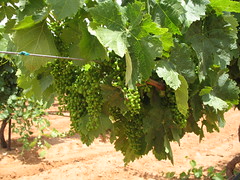 After all the vineyards I've seen, these are the ones I most care about, and I hoped Bobby had some good news for me about the future.
After all the vineyards I've seen, these are the ones I most care about, and I hoped Bobby had some good news for me about the future.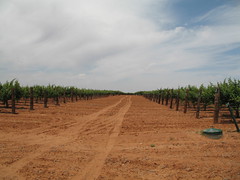 Before dinner that evening, Bobby pulled out a couple of Texas Viogniers that can be found on the shelves in the larger metro areas. Neither was worth finishing; one was flawed in a typical way I find with Texas wine and smelled like Pineapple scented fingernail polish, and the other was just dull as hell. This was what I expected, what I was used to. But with the first course, the another Viognier appeared, one Bobby had made under the label 'Brennan', and the difference was astonishing. This one was crisp, unflawed, and true to varietal. The second bottle was one that had been made by a new winery in the Hill Country AVA (my backyard) with Bobby's Grenache and Mourvedre.
Before dinner that evening, Bobby pulled out a couple of Texas Viogniers that can be found on the shelves in the larger metro areas. Neither was worth finishing; one was flawed in a typical way I find with Texas wine and smelled like Pineapple scented fingernail polish, and the other was just dull as hell. This was what I expected, what I was used to. But with the first course, the another Viognier appeared, one Bobby had made under the label 'Brennan', and the difference was astonishing. This one was crisp, unflawed, and true to varietal. The second bottle was one that had been made by a new winery in the Hill Country AVA (my backyard) with Bobby's Grenache and Mourvedre. 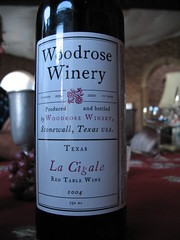 Woodrose Winery's 'La Cigale' is a jammy, unwooded and traditional Rhone style wine that's actually consistent with its price point of $17. I didn't think such things happened in Texas. Already convinced that Bobby's aspirations were attainable, I was blown away again when he pulled out a magnum of a 1982 Pheasant Ridge 'Proprietor's Reserve' to make his final point: there have been in the past, and will be in the future Texas wines built to last. Still vividly youthful in color, but with mature, baked fruit flavors and earthy notes, I was just beside myself: can it be true? Can great wines come from Texas?
Woodrose Winery's 'La Cigale' is a jammy, unwooded and traditional Rhone style wine that's actually consistent with its price point of $17. I didn't think such things happened in Texas. Already convinced that Bobby's aspirations were attainable, I was blown away again when he pulled out a magnum of a 1982 Pheasant Ridge 'Proprietor's Reserve' to make his final point: there have been in the past, and will be in the future Texas wines built to last. Still vividly youthful in color, but with mature, baked fruit flavors and earthy notes, I was just beside myself: can it be true? Can great wines come from Texas?After dinner we gather around a giant topographic map of the northwest part of the state. Bobby points to a section south and west of Lubbock, aka Nowhere Near Nothing, and describes to me the potential he believes this unknown spot has for grape growing. "It's a whole little microclimate to itself," he explains, and tells me how he's doing his best to gather up growers to move into the area and cultivate it. One of those potential growers is at the party, and is contemplating moving his family from Austin to the bleak dustiness of Cotton Country to raise grapes. At first, I'm inclined to cringe. There's not a lot out here. Lubbock is an old college town that's so flat it makes Kansas look busty. I'd lose my mind, personally. But by the end of the evening, I'm searching for this guy's phone number to beg him to get himself out there, and start getting that fruit going. I'm convinced that the key to Texas success is this High Plains fruit, and that Bobby Cox is destined to be a part of that success.
Interview with Bobby Cox, Texas High Plains Grower

How'd you and wine get together?
I was a farm kid that found wine while I was at Tech, discovered great French wines, and had this incredible eppiphany when I realized we could make absolutely world class wines from the High Plains. And I'd heard everything that you have, that it's too hot, it's too cold, it's too dry or too wet, but when you smelled the wines you could tell they were going to be wonderful wines. And I didn't exactly know why the wines were wonderful, but I knew they were.
Bobby, tonight we've had some really good wines, wines that I wouldn't have expected to come from Texas. We've had a Viognier as good as any from California I've had, we've had the Woodrose Rhone blend, which is impressive, and you've proven that, at least at one point, Texas built wines that could age well. So if it's possible, what does Texas have to do to break into the National market?
We need a little noise. We need critics to taste these better wines and know we can make them again, that we will make them again. We need commitment from growers like Cliff who was here tonight, to rouse the confidence to plant more grapes. Those were wines that weren't hard to make, considering the quality of fruit that was available. And we'll make more.
Tell me a little about what's going wrong right now in the Texas wine industry.
People never get to taste the good Texas wines. Distribution is limited. Wines that need to be made don't get made. Basically, the grower is isolated from the market. That's 99% of the problem. We can grow the most magnificent wines here, but we're having problems reaching over to the consumer and letting them know what we can do.
What's the disconnect?
An aggressively antagonistic legal system is most of that problem. And the fact that wine is not understood in Texas, that people don't trust their own tastes. Limited access is a huge portion of that disconnect. I love the quote by the Roman wine writer Ciserna, talking about how all these upstart wines from Gaul are depriving good, honest Roman winegrowers of their livelihood. These are wine regions like Chateneuf Du Pape, Cote Rotie and Hermitage. This has been going on for forever, and will go on in the future. It's tough for the new guy, tough to break in.
What's the greatest enemy of the success of Texas wine right now?
Lack of penetration of the market. Lack of capital. Big companies have such a large share of the market that they control the shelf space. Big California wineries have a lot of clout in Texas.
Does that become a distribution problem as well?
Absolutely.
When we were in Martin's Vineyard you were talking about Australia, and how if circumstances were different fifteen years ago, we could be close to where they are now. Talk me through what happened to the Texas wine industry in the eighties.
Well, House Bill 1445 was extremely destructive to the Texas wine industry. It made it more difficult for Texas wineries to sell the fruit. It restricted the market...
(THUNDERCLAP)
Whoa! Texas thunderstorms, yeah!
(A hubub ensues as dogs are hushed and Cliff, another guest and potential winegrower, begins making the rounds to leave. I leave the recorder going while I dig for a card. Jennifer Cox reminds Bobby that "what convinced you that (Texas wines) could be good was going to France!")
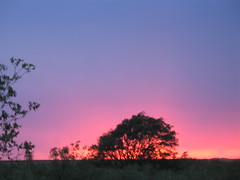
Oh, gosh yeah. France was wonderful. In 1976, we went to California, Clay MacPherson and Bob the original winemaker for Gallo of Sonoma. We had great introductions, we went to all these wineries...they had a lot of nice, new, shiny equipment, modern wineries.
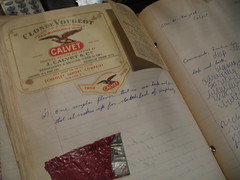 We went to France the next year, we went to Alsace, to the Rhone, to Burgundy and Bordeaux, and these guys were making wonderful wines with no equipment. They had nothing...handlevered pumps, canvased hoses, old barrels, and concrete tanks. And we realized that what it took to make great wine was great grapes. We knew we could do that. I was a farm kid, I knew I could grow them. I knew we could do it. That's when we made the decision to start Pheasant Ridge.
We went to France the next year, we went to Alsace, to the Rhone, to Burgundy and Bordeaux, and these guys were making wonderful wines with no equipment. They had nothing...handlevered pumps, canvased hoses, old barrels, and concrete tanks. And we realized that what it took to make great wine was great grapes. We knew we could do that. I was a farm kid, I knew I could grow them. I knew we could do it. That's when we made the decision to start Pheasant Ridge.What happened to the Texas Hill Country?
Well, now I'm not down there, I don't know. The disease problem is very serious. But they have a wonderful access to the market. You've got millions of people, from Austin and Houston and San Antonio, they're a day's drive away. There's some good wines that can be made down there, but the economics of it...I don't know.
So is the answer for the grapes to be grown up here on the High Plains and sourced out to the winemakers in the Hill Country, who have better access to the market?
Right now, the formula for success is for the grapes to be grown up here and the wine made down there. Eventually, there will be wineries up here that will be able to penetrate the market. Our current legal system won't permit that.
Talk terroir with me.
I could talk about terroir all day. The (Woodrose) La Cigale is a great expression of terroir, without any oak influence...it comes back to what Kermit Lynch said about place. We want this wine to taste like this place. And there are a lot of ways we could jimmy that, as winegrowers, to fit the market. It's obvious that we're a warm region, we need to be growing grapes that do well in warm regions, like Grenache, Tempranillo, Mourvedre.
********
I'm home now in Austin. Damn, what a trip that was, people. Gonna need some time to wrap my little mind around it. Next post: The Cork and Demon Western Wine Tour Wrapup, including pictures, fascinating stats from the road, and an enormous Mega List of Wines That Do Not Suck from all over the West. In the meantime, an imbibment of the highest quality is in order here to toast my return:
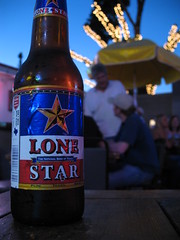
Clinkies.

Clinkies.

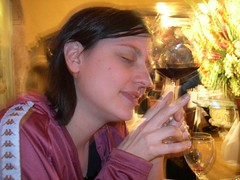



3 Comments:
taj-
Glad you had a good time at my folks' house. I'll go ahead and identify myself as the anonymous bonehead that didn't catch the High Plains Drifter reference. I talked to Benedicte Rhyne today, the winemaker of the La Cigale and it's almost gone. She said to try to find it from Woodrose direct or at times ten in Dallas.
The Brennan Vineyards grand opening was this weekend and all involved seemed to have a great time. The Viognier showed very well as did the High Plains Muscat. Cliff's Viognier should make darn good wine for someone this year too.
As we know, wow gold,wow gold in world of warcraft game is very important ,so you can buy wow gold,buy wow gold from pobobo, be a professional free wow gold, free wow gold and really free wow gold store have been created for many years, we supply cheap wow gold,cheap wow gold for local customers. you may find wow gold guide,wow gold guide and world of warcraft gold on our website.
As we know, wow gold guide,buying wow gold and on our website. We have available stock of gold on most of the servers,cheapest wow gold so that we can do a really instant way of delivery This not only translates from gaining levels, but also in upgrading equipment. New equipment is not cheap though.Wlecome to free wow gold.
Post a Comment
<< Home